Last August, Apple Music was updated with a new section in Browse curated by Deutsche Grammophon, one of the biggest classical music labels in the world. While classical music fans welcomed the specific focus of the area, many of our readers quickly pointed out the numerous issues that remain for classical listeners on a daily basis within Apple Music, and the fact that they've been there since the launch of the service with seemingly no correction in sight.
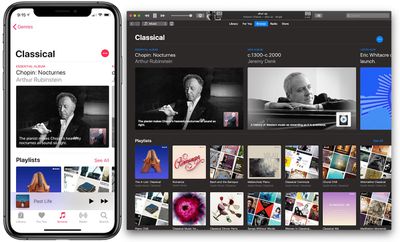
To help break down and highlight these problems, we reached out to a few experts in the classical music field, including professor Benjamin Charles, who wrote a blog post about his frustrations with streaming music services last October. We also spoke with Franz Rumiz, a classical music fan whose article "Why Apple Music fails with classical music" struck a chord with the community in early 2017.
Frustrations with classical music streaming are nothing new, but as Charles tells us, this is a problem that affects nearly every streaming music service, including Apple Music rival Spotify. In an effort to find out exactly what's wrong with classical music on Apple Music -- and what steps could be taken to address these problems -- we asked Charles and Rumiz to detail the biggest issues with classical music on Apple Music.
The Problems
Classical music is treated as a single genre
When you tap on "Genres" in Apple Music's Browse tab, you're treated with a list of over 30 styles of music, from Alternative and African Music to Christian, Electronic, K-Pop, and Metal. This is where classical music fans have to visit to find their favorite music, within the singular "Classical" genre section.
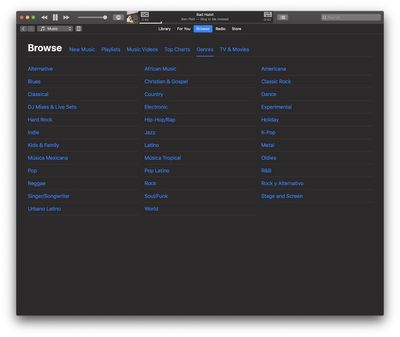
For Charles, this is the first in a long line of problems. The section spans centuries, including all of the notable composers like Mozart (born 1756, died 1791), Maurice Ravel (b. 1875, d. 1937), and John Cage (b. 1912, d. 1992), but this grouping is frustrating for classical music aficionados, given how little these musicians have in common among one another.
Charles: "...We’re treating around 300 years of music from various countries, forms, philosophies, and so on as one genre. As far as modern commercial music, we don’t group the past 50 years together: can you imagine how strange it would be to group LL Cool J, Metallica, and The Spice Girls together? These are all artists that were popular in the 90s; beyond that, they have virtually nothing in common. Grouping together Mozart, Ravel, and Cage makes even less sense."
Rumiz: "The sorting of recordings follows the rules of pop & rock genre. For classical music this doesn’t fit at all, because you very often want to compare different recordings of the same pieces by the same composer with different soloists, orchestras and conductors. It is very complicated and sometimes impossible to sort and find recordings by these categories."
Classical music wasn't designed to fit in modern album templates
Streaming classical music on a service like Apple Music forces the expansive art form into a strict, boundary-ridden template. Because of this, numerous aspects of the music are truncated in a way that deflates their impact, particularly for anyone without existing knowledge of classical recordings.
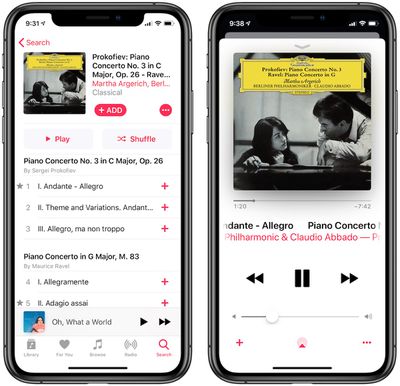
Charles says that one aspect of classical music that's mixed up in the shuffle is the listener's interest in a piece's composer versus its performer. While some artists, like Leonard Bernstein, both compose and perform their music, Charles questions how Apple Music determines the best recording for a piece of music: "Is a recording more significant because it is composed by Bach, or is it more significant because it is performed by Glenn Gould?"
Further complicating matters, orchestral recordings introduce both the conductor and orchestra as contributors, essentially breaking any possibility for these pieces to be read and seen within the boundaries of a modern album format. With concerti, the soloist, composer, and orchestra also need credit.
This results in albums with names like "Prokofiev: Piano Concerto No. 3 in C Major, Op. 26 - Ravel: Piano Concerto in G Major, M.83; Gaspard de la nuit, M. 55," credited to "Martha Argerich, Berlin Philharmonic & Claudio Abbado."
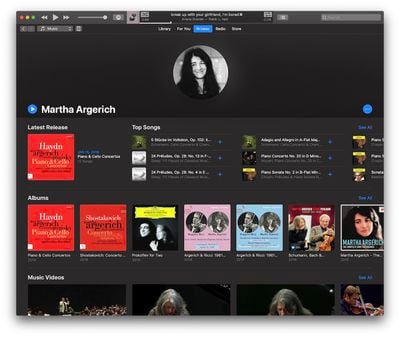
Not only is this far too much information to read clearly in Apple Music, but the app's basic UI functions fail to provide links to every credited artist, making further classical music discovery a frustrating endeavor. In the above example, the link for "Martha Argerich, Berlin Philharmonic & Claudio Abbado" directs listeners only to Martha Argerich's Apple Music profile page.
Charles: "That is a lot more difficult to follow than The Wall by Pink Floyd. Clicking the performer’s name in this case links you to more Martha Argerich recordings—what if you’re curious to hear more of the Berlin Philharmonic or Claudio Abbado? (And I won’t even bother going into the complications that come with identifying an opera cast.)
In short, classical music was not designed with the album format in mind. Some pieces are substantial enough that they could fill up an entire album (Mahler’s Symphony No. 5 comes to mind); some are even so long that they would exceed the length of a traditional album (Steve Reich’s Drumming comes to mind). Some are also less than a minute long (Bach Two Part Inventions come to mind)"
On that note, Rumiz points out that classical music playlists are essentially nonsense. This is because each playlist takes in arias and overtures from various operas, completely disrupting the ordered way that classical music is intended to be listened to. This happens in playlists like Apple's "Essentials" for composers like Richard Wagner, and in mood playlists designed for studying or relaxing.
Rumiz: "Again Apple offers something for their mainstream audience which doesn’t fit the genre. I don’t want to hear just one part of a symphony, I want to listen to the whole thing! The same applies to classical music radio."
Siri isn't very helpful
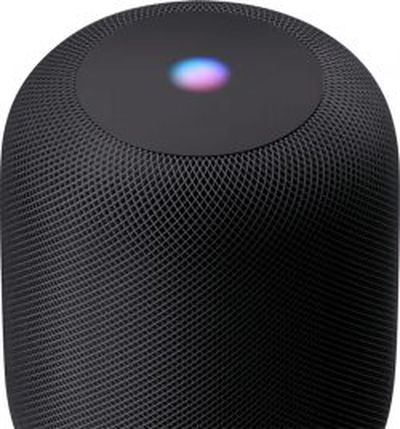 Because of these wordy titles, any voice-enabled features touted by Apple and found within Apple Music are much harder to use for classical music fans.
Because of these wordy titles, any voice-enabled features touted by Apple and found within Apple Music are much harder to use for classical music fans.
As Charles bluntly puts it, "Can you imagine: 'Hey Siri, play the third movement of Prokofiev's Piano Concerto No. 3 from the album Prokofiev: Piano Concerto No. 3 in C Major, Op. 26 - Ravel: Piano Concerto in G Major, M.83; Gaspard de la nuit, M. 55 by Martha Argerich, Berlin Philharmonic & Claudio Abbado."
In our tests, simply stating "Hey Siri, play Prokofiev's Piano Concerto" did lead to Siri playing the correct concerto in the correct order, but as with all things Siri, the command was not consistently reliable. The proclivity toward the use of foreign language titles for some pieces, and the acceptance of English versions of the same titles, also regularly stumps Siri.
"Sometimes we use English titles, sometimes we use foreign language titles; 'The Rite of Spring' and 'Le Sacre du printemps' seem to be used equally to describe the same piece," Charles explains.
There are breaks between each track
Rumiz's biggest issue with classical on Apple Music is the breaks that happen between tracks in recordings (this frustration originally led Rumiz to write his Medium post on the topic). For any classical piece that is through-composed (music intended to be played from beginning to end in one continuous stream), Apple Music interrupts the fluidity of the piece by placing a break of ~1 second between each track.
Rumiz does point out that Apple has removed these breaks from many recordings over the years, but it isn't solved for all recordings.
Rumiz: "I find these breaks in the middle of a thrilling, highly emotional classical symphony to be annoying — they are destroying the concentration and pleasure of the listener."
There is a large barrier to entry for new listeners
This is Charles' biggest problem with classical on Apple Music. Although the browsing and playback experience can be awkward, the music professor ultimately notes that his background and education in the subject help him navigate Apple Music's less-than-stellar classical music selection with some ease. If you're on the other end of that spectrum, trying to get into the genre and navigating 300+ years of music on Apple Music, it's "effectively impossible."
Charles is understandably disappointed in the lack of education and forethought put into classical selections on Apple Music. There are no program notes, select few pieces of biographical information, and no guidance when navigating among composers. Despite the music having thorough research readily available, Apple Music ditches all interconnections between notable composers in favor of static tabs of music lists.
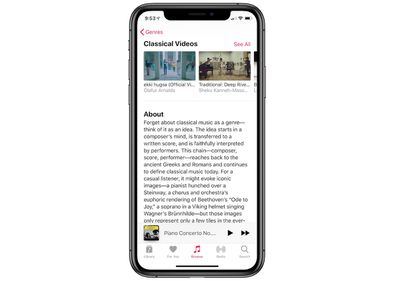
Listening to classical music often requires the listener to understand the work in context to get everything out of it. Without these tidbits of history, connective tissues between composers, and educational program notes, Apple Music fails this fan base.
Charles: "So in short, classical music is left to an exclusive crowd of enthusiasts that already know what they are looking for. Apple prides itself on making devices and services with user interfaces that anyone can use, yet classical music remains locked in a vault for the select few that already know it inside and out."
There's a lack of legitimacy
As an extension of the previous grievance, Apple Music's Beethoven page lacks a link to the composer's spiritual successor, Brahms, but it does provide a link to an artist named "Chopin." Unfortunately, this is not the Polish composer, but a rapper who appeared on a hip-hop song named "Circumstance," which was released in 2018. "Even if it did link to the correct Chopin, there are far more relevant composers to link to," Charles points out.
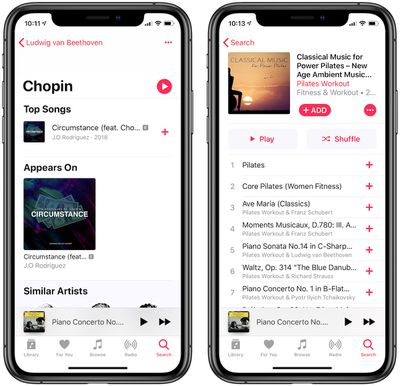
Furthermore, Apple populates composer pages with songs from albums and playlists that don't necessarily paint these artists in a respected light. Beethoven's "Top Songs" include songs from albums like "The World's Most Beautiful Wedding Music," "Classical Music for Power Pilates," and "Exam Study." While relevant to each of these activities, Apple's decision to push these results higher on the page above more reputed collections "sends strong signals of a lack of legitimacy in the classical music world," Charles argues.
The Solutions
Build better composer pages and offer more categories
This would be feasible, since Apple just last year updated the artist pages across Apple Music with new profile picture designs, new featured albums, album reorganization, and a "play all" button. Although composers and their works are inherently more complex, Charles points out that some already have their own identification systems, including the Bach-Werke-Verzeichnis (BWV) catalog for Bach and the Köchel (K) catalog for Mozart, which have the potential for streamlined integration into Apple Music.
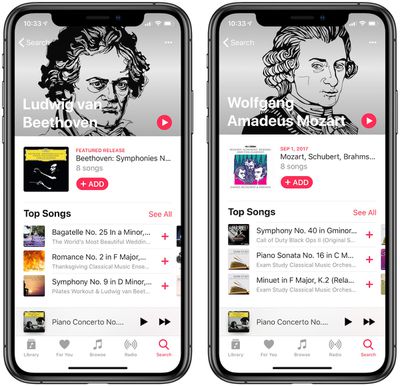
In the same vein, Rumiz says more categories would do wonders for expanding the ease-of-use of classical on Apple Music, by offering more complex categories like "soloist" and "conductor," instead of following the rules of pop and rock music where songs only have one artist. While this would be a big task for Apple, Rumiz notes that it will be "necessary if they want classical music fans to continue using Apple Music on the long run."
Fix irrelevant recommendations
In a simpler and easier solution, Charles hopes Apple can more intelligently guide users to important and noteworthy composers, pieces, and musicians, that actually have relevance to one another. No more erroneous "Chopin" pages and "Ode to Joy" recommendations found within Power Pilates playlists.
Make it smarter and hire a human curator
Overall, Charles is hoping for Apple to boost the intelligence of its classical music section on Apple Music. To start, he recommends Apple hire a musicologist whose job it would be to personally back the rejuvenation of the classical music features on the service. This would be just like most other sections of Apple Music, where algorithms are backed and double-checked by human editors, like Arjan Timmermans's role as Apple Music's "Head of Pop."
This includes adding program notes that would enhance the listener's understanding of classical music, so that they're actually taking part in digesting and understanding the composition and not just passively listening. Charles explains the importance of knowing a piece's real-world history: "Berlioz's Symphonie Fantastique is a great example: it features a story (loosely based on the composer's own life) of an artist obsessing with a love interest, taking opium, and murdering his beloved in a drug-induced trip. This sort of thing kind of changes how you hear a piece!"
Charles: "Effectively, the service should offer somewhat of a university-style music appreciation course for the average listener."
Acquire a company that does most of this already
In a move that would make sense given Apple's history, Apple could also simply acquire a company that's doing most of these things already, and implement the technology within an update to Apple Music. Charles pointed me toward the Berlin Philharmonic's Digital Concert Hall [Direct iTunes Link], a classical music streaming service that has live and on-demand concerts (up to 40 each season), hundreds of archived recordings covering five decades, composer interviews, documentaries, artist portraits, and a family-friendly education program that dives into the history of each piece.
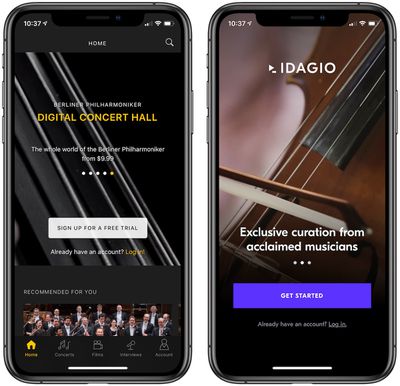
While the Digital Concert Hall mostly lacks simple music streaming, if Apple made a deal with Berlin Philharmonic, the service's features would greatly boost classical music offerings on Apple Music.
Rumiz doesn't recommend an outright acquisition, but he does point towards a company and service that is already leagues ahead of Apple in the classical music field: IDAGIO [Direct iTunes Link]. This service costs $9.99/month and focuses solely on classical music. While some important recordings are missing and require him to return to Apple Music or Spotify, Rumiz says that IDAGIO's usability and interface are far better than Apple Music, eliminating many of the frustrations classical fans have with streaming services.
Boost the video offerings
According to Rumiz, a well-organized and fully featured suite of classical video content "could be an important selling point" for a streaming service intent on gaining more classical fans. Apple has a few of these, offering background interviews with artists, but Rumiz points toward YouTube Music as the current leader in this category, since it offers full recordings of concerts and operas.
The Future
In the end, Apple -- and Spotify, Google, Amazon, etc. -- have a tricky battle ahead of them if and when they decide to address the issue of classical music on streaming services. "It doesn't seem to be a business priority [for Apple]," Charles admits, and in the current scheme of things, the company's focus on pop and hip-hop in Apple Music is logical from a financial standpoint.
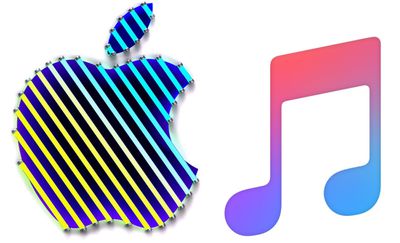
But that doesn't change the fact that there are millions of classical music fans willing and ready to pay the company that can get these things right. "This is a completely untapped market," Charles tells me. "One streaming service could completely own the classical music audience if it wanted to."























